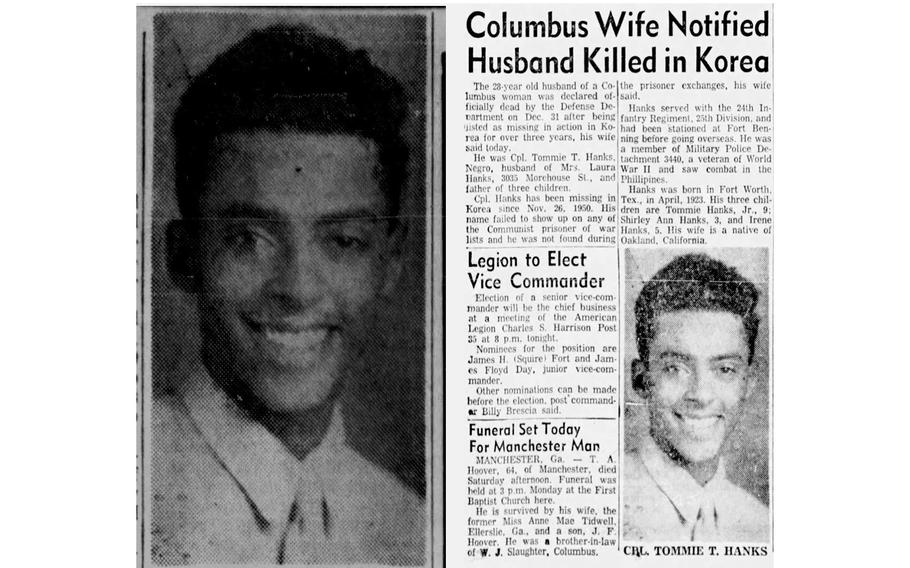
Korean War veteran Army Cpl. Tommie T. Hanks was killed in action in 1950 during the Korean War. His remains have been identified 72 years later. (DPAA)
He was killed on the battlefield aged just 27 while fighting in the Korean War in 1950. Now, 72 years later, U.S. Army Cpl. Tommie T. Hanks has finally been identified and accounted for.
Cpl. Hanks was originally from Fort Worth, Texas, and was reported missing in action on Nov. 26, 1950, after his unit was attacked by the enemy as it attempted to withdraw from east of the Ch'ongch'on River near Anju in North Korea, according to a statement from the Defense POW/MIA Accounting Agency (DPAA) this week.
"Following the battle, his remains could not be recovered," the DPAA said, and Hanks was declared "nonrecoverable" on Jan. 16, 1956.
However, after a historic meeting between former president Donald Trump and North Korean leader Kim Jong Un in June 2018, Pyongyang turned over 55 boxes to U.S. authorities that "purported to contain the remains of American service members killed during the Korean War."
The remains were taken to Joint Base Pearl Harbor-Hickam in Hawaii, where DPAA laboratory experts worked to identify the individuals. Scientists "used anthropological and isotope analysis" as well as DNA evidence to identify Hanks.
His body was finally accounted for in August 2022, the DPAA said, and it found "no evidence that he was ever a prisoner of war."
Cpl. Hanks is thought to have joined the U.S. Army from Georgia and served in E Company, 2nd Battalion, 24th Infantry Regiment, 25th Infantry Division, it added.
His name was previously recorded at the National Memorial Cemetery of the Pacific in Honolulu, along with others who are still missing from the Korean War. Now, the DPAA said a "rosette will be placed next to his name to indicate he has been accounted for."
Hanks is due to be buried at Arlington National Cemetery in the near future.
The Korean War took place from 1950 to 1953 and saw Soviet-backed North Korea invade newly formed South Korea, a country established after World War II with the support of the United States and United Nations.
It resulted in a civilian death toll of more than 3 million Koreans. The combatant death toll was also devastating for the two Koreas and China, which lost at least 180,000 soldiers, and the United States, which suffered about 33,000 deaths.
Yet the conflict is often described as America's "forgotten war," with veterans expressing frustration, borne of the perception that their military service is appreciated more overseas than at home by fellow Americans.
According to the DPAA, the remains of over 450 Americans killed in the war have been identified and returned to families for burial "with full military honors" since 1982. This is in addition to the approximately 2,000 Americans whose remains were identified in the years immediately following the end of hostilities.
However, over 7,500 U.S. soldiers are "still unaccounted-for from the Korean War, hundreds of whom are believed to be in a 'non-recoverable' category," it said.
Identification is challenging as "cases from Korea represent highly commingled human remains involving thousands of missing persons from varied proveniences," according to the ongoing government-backed Korean War Identification Project, which works with historians, scientists and families in the hope of identifying more slain soldiers.
The Washington Post's Andrew Jeong contributed to this report.